Showing 1-20 of 40 results
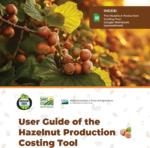
User Guide of the Hazelnut Production Costing Tool
Hazelnut growers can use this tool to estimate their costs of production. This information by Oregon Tilth can be used to help growers better understand their cost structure and explore how changes to production practices, yields and price will impact net returns and long-term viability. The link to the tool is included in the guide.
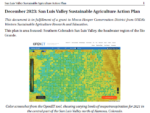
San Luis Valley Sustainable Ag Action Plan
This plan is area focused: Southern Colorado’s San Luis Valley, the headwater region of the RioGrande. Irrigation in this high, arid valley is from a combination of surface water from the Rio Grandeand its tributaries, and pumping from confined and unconfined aquifers. Because these waterresources are overdrafted and connected, managing for sustainability of agriculture involves […]
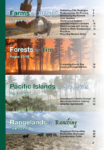
Adapting to a Changing Climate
Western SARE has released our 28-page publication, Adapting to a Changing Climate: How Western SARE is Meeting the Needs of a Warming West.
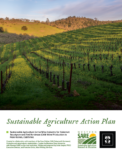
CAB Collective Sustainable Agriculture Action Plan
The Sustainable Agriculture Action Plan for Cabernet Sauvignon and red Bordeaux (CAB) Wine Production in Paso Robles is a document developed by the Paso Robles CAB Collective winegrape growers, winemakers, marketers, proprietors, and other wine industry stakeholders for under a pilot grant program by Western SARE.
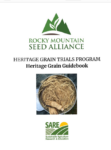
Heritage Grain Guidebook
From 2016 through 2021, Rocky Mountain Seed Alliance (RMSA) worked with a grassroots network of nearly 200 grain growers in varying climates, initially across the Western United States and eventually growing nationally and globally, in trialing over 250 varieties of ancient and heritage grains including Indigenous and alternative (pseudo) grains to determine varieties that can thrive in the changing climate conditions of the 21st century. Through this effort, 20 of the most adaptive and resilient varieties of cereal grains, including wheat, barley, and rye, of which there was enough seed stock, were selected for formal replicated research trials at four locations in the Mountain West. Results of both the participatory grassroots trials and the research trials, including grower and grain profiles, are documented in this manual in an effort to inform and inspire others to grow these unique varieties of grains, and to support regionalized grain networks and localized food systems.
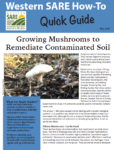
Growing Mushrooms to Remediate Contaminated Soil
Mushrooms can bio-remediate certain contaminated soils, although it's not a simple or foolproof process. But for someone interested in mushrooms or already growing them, it can be work the effort.
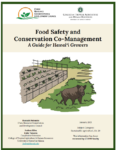
Food Safety and Conservation Co-Management: A Guide for Hawai‘i Growers
A guide for Hawaii farmers interested in improving their efforts towards food safety and improving natural resource conservation, through co-management practices. This document acts as a resource to both learn more about suitable techniques while reviewing pros and cons as shared by local producers, as well as provide template language and guidance towards implementing such […]
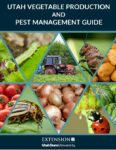
Utah Vegetable Production & Pest Management Guide
Partially funded by Western SARE, the Utah Vegetable Production and Pest Management Guide is inclusive to all growers, whether commercial or hobbyist. Although content is specific to Utah, most content applies to the Intermountain West states. The book includes twelve chapters of specific production methods and comprehensive pest and treatment recommendations for crops representing brassicas, […]
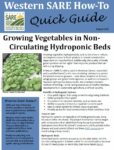
Growing Vegetables in Non-Circulating Hydroponic Beds
Growing vegetables hydroponically, such as bok choy or lettuce, can improve access to fresh produce in remote communities dependent on imported food. Additionally, the quality of locally grown produce can be higher than imported produce that can wilt during shipping. Download PDF
2018 Annual Report and Impacts
In 2018, Western SARE provided nearly $4 million in funding to projects in the region. These included Research & Education, Professional + Producer, Professional Development, Farmer/Rancher and Graduate Student grants.
2019 Annual Report and Impacts
In 2019, Western SARE provided over $5.6 million in funding to projects in the region. These included Research & Education, Professional + Producer, Professional Development, Farmer/Rancher, Research to Grassroots, and Graduate Student grants.
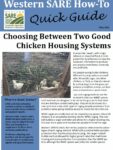
WSARE Quick Guide: Choosing Between Two Good Chicken Housing Systems
Quick guide to choosing between chicken caging systems.
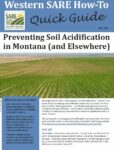
WSARE Quick Guide: Preventing Soil Acidification in Montana (and Elsewhere)
Quick guide to preventing soil acidification in Montana.
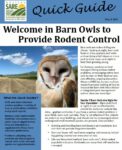
WSARE Quick Guide: Welcome in Barn Owls to Provide Rodent Control
Quick guide to encouraging barn owls to provide rodent control.
2020 Annual Report and Impacts
In 2020, Western SARE provided over $6.1 million in funding to projects in the region. These included Research & Education, Professional + Producer, Professional Development, Farmer/Rancher, Research to Grassroots, and Graduate Student grants.
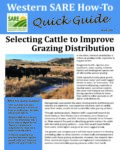
WSARE Quick Guide: Selecting Cattle to Improve Grazing Distribution
Quick guide summarizing what you can do to select cattle to improve grazing distribution.
Photosynthesis & Hydroponics Lesson & Demonstration
Mt. Lata Farm in America Samoa created a Teachers' Resource Tool Kit with lesson plans on growing vegetables using hydroponics. This is one sample. For more information, contact the Project Leader .
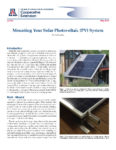
Solar Energy Training Program
Fact sheets/bulletins on the fundamentals of solar photovoltaic energy systems.
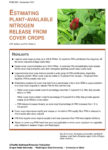
Estimating Plant-Available Nitrogen Release from Cover Crops
This Oregon State University fact sheet explains the basics of plant-available nitrogen (PAN); when to kill cover crops for the maximum PAN benefit; step-by-step instructions on how to perform site-specific measurements to predict PAN from your cover crop; and case studies from the Willamette Valley.
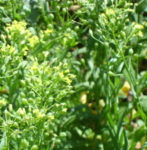
Growing Camelina for Biodiesel
This bulletin investigates the tradeoffs for a potential on-farm biodiesel production enterprise from dryland camelina to understand when and if it can be economically viable. Is Biodiesel from Camelina Right for You? This bulletin is based in part on on-farm trials evaluating camelina sativa production. Download an interim report from this research.